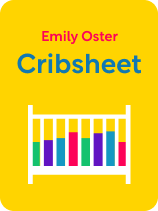

This article is an excerpt from the Shortform book guide to "Cribsheet" by Emily Oster. Shortform has the world's best summaries and analyses of books you should be reading.
Like this article? Sign up for a free trial here.
What is Emily Oster’s potty training approach? When should you start potty training a child? How should you discipline children during this stage?
Emily Oster is the bestselling author of a series of parenting books offering a data-driven approach to parenting and making decisions as a parent. According to her, potty training and discipline are two controversial topics in parenting, but when done correctly, can foster independence in children.
Read on for Emily Oster’s potty training and discipline advice for parents.
Emily Oster on Potty Training
Many parents wonder when to start potty training their toddler. According to Emily Oster’s potty training research, most U.S. children complete their potty training when they’re between 21 and 30 months old regardless of how early they start training. If you start potty training early (when a toddler is one and a half), you’ll use fewer diapers—but the entire process of training will take longer (close to 10 months). If you start potty training later (when a toddler is older than two), you’ll use more diapers—but the process will take less time (close to three months).
(Shortform note: Aside from Emily Oster’s potty training research, other research on global potty-training practices reveals that many parents outside the U.S. potty train their children earlier than U.S. parents do. This research underscores Oster’s overall claim in her book that there isn’t just one right way to make parenting decisions, and it adds the perspective that your cultural practices shape how you approach potty training. For instance, most toddlers living in rural China are potty-trained before they’re 24 months old, thanks to the help of pants that feature a split seam at the crotch. These pants make it easier for children to use the toilet because they don’t have to take time to remove their pants.)
Parents also wonder what’s the best approach to potty training. According to Emily Oster, there’s no research indicating that parent-driven approaches to potty training are any more or less effective than child-driven approaches.
Parent-driven approaches such as Oh Crap! Potty Training have you dictate the training timeline, such as when to stop using diapers and when to transition your child to the next phase of training. By contrast, child-driven approaches have the child indicate when they’re ready to start using the toilet and move through these phases. Given these data, Emily Oster claims that the best you can do is strive for consistency in potty training: Pick an approach and commit to it.
(Shortform note: Although research provides no evidence that parent-driven approaches work any better or less than child-driven ones, experts claim that which approach you should choose may depend on your child’s personality. For instance, if your child is stubborn, a child-led approach may work best for them. This approach could help prevent your child from resisting your efforts to train them before they’re ready. By contrast, if your child seems eager to please and thrives on praise, a parent-driven approach may help move them through the potty-training process.)
Disciplining Your Child
Aside from Emily Oster’s advice about potty training, she also offers tips for disciplining your child in her book Cribsheet. According to research, approaches to disciplining your child are most effective when they 1) don’t involve corporal punishment; and 2) use consistent rewards and consequences. Let’s explore these two ideas further:
No corporal punishment: According to research, there’s no evidence that corporal punishment (such as spanking) improves children’s behavior, and there’s some evidence that it makes their behavior worse.
(Shortform note: Why do parents sometimes resort to corporal punishment, and why does this approach make children’s behavior worse? In No-Drama Discipline, Tina Payne Bryson and Daniel Siegel claim that parents sometimes use corporal punishment when they don’t have another plan for discipline in place. In the absence of a go-to plan, parents base their responses to misbehavior on their current emotions and resort to physical force when they feel angry or frustrated. Bryson and Siegel argue that spanking leads children to misbehave more because it makes them feel threatened. This threat activates the primitive parts of their brain rather than the parts that allow them to calm down and correct their behavior.)
Consistent rewards and consequences: Approaches such as 1-2-3 Magic recognize that when children misbehave, they don’t learn from long discussions about why their misbehavior was bad. Instead, their behavior improves when you reward them or provide them with consequences according to consistent rules.
For example, imagine you’re trying to teach your child to only run when they’re outside. If you ever catch them running, don’t give them a long speech about how running inside is dangerous. Instead, tell them you’ll be taking away five minutes from their outdoor play time (something they love). Any time your child runs indoors, give them this same consequence—even if it feels mean to reduce their outdoor playtime. You can also reward your child any day they refrain from running indoors by adding extra outdoor playtime.
(Shortform note: In No-Drama Discipline, Bryson and Siegel argue that understanding why your child misbehaves prepares you to deliver consistent consequences in a loving, caring way. They suggest that any time your child misbehaves, you should consider what goal or need they were trying to meet. This can help you see things from their perspective, respond more calmly, and implement a consequence that teaches them a lesson without depriving them of their physical or emotional needs.)

———End of Preview———
Like what you just read? Read the rest of the world's best book summary and analysis of Emily Oster's "Cribsheet" at Shortform.
Here's what you'll find in our full Cribsheet summary:
- Why there isn't one right way to parent a young child
- How to make research-based parenting decisions
- When you should start potty training your toddler






